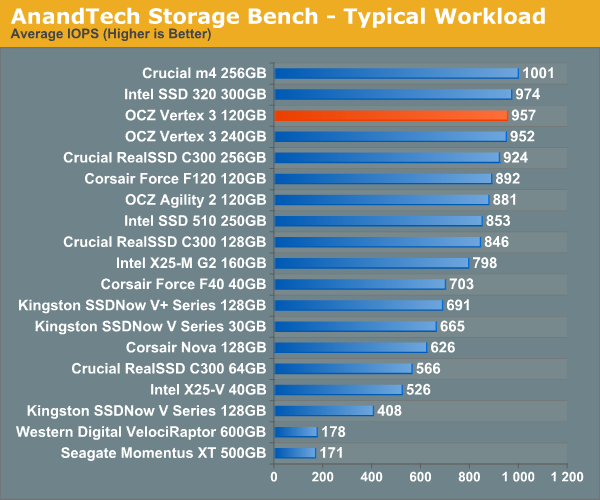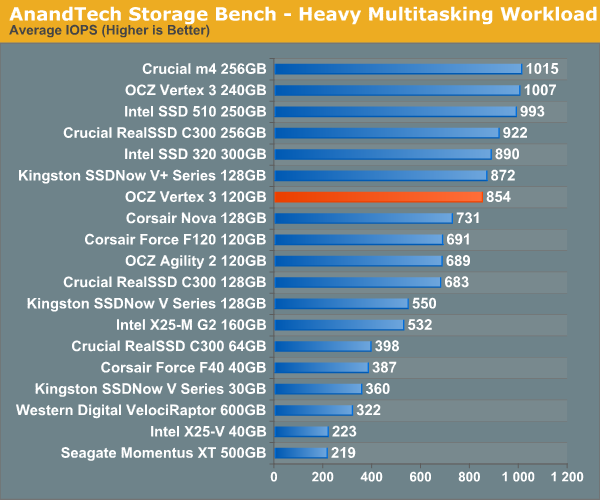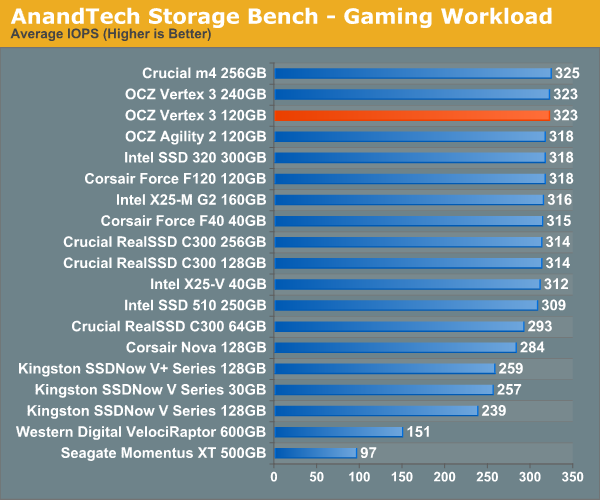The OCZ Vertex 3 Review (120GB)
by Anand Lal Shimpi on April 6, 2011 6:32 PM ESTAnandTech Storage Bench 2010
To keep things consistent we've also included our older Storage Bench. Note that the old storage test system doesn't have a SATA 6Gbps controller, so we only have one result for the 6Gbps drives.
The first in our benchmark suite is a light/typical usage case. The Windows 7 system is loaded with Firefox, Office 2007 and Adobe Reader among other applications. With Firefox we browse web pages like Facebook, AnandTech, Digg and other sites. Outlook is also running and we use it to check emails, create and send a message with a PDF attachment. Adobe Reader is used to view some PDFs. Excel 2007 is used to create a spreadsheet, graphs and save the document. The same goes for Word 2007. We open and step through a presentation in PowerPoint 2007 received as an email attachment before saving it to the desktop. Finally we watch a bit of a Firefly episode in Windows Media Player 11.
There’s some level of multitasking going on here but it’s not unreasonable by any means. Generally the application tasks proceed linearly, with the exception of things like web browsing which may happen in between one of the other tasks.
The recording is played back on all of our drives here today. Remember that we’re isolating disk performance, all we’re doing is playing back every single disk access that happened in that ~5 minute period of usage. The light workload is composed of 37,501 reads and 20,268 writes. Over 30% of the IOs are 4KB, 11% are 16KB, 22% are 32KB and approximately 13% are 64KB in size. Less than 30% of the operations are absolutely sequential in nature. Average queue depth is 6.09 IOs.
The performance results are reported in average I/O Operations per Second (IOPS):

If there’s a light usage case there’s bound to be a heavy one. In this test we have Microsoft Security Essentials running in the background with real time virus scanning enabled. We also perform a quick scan in the middle of the test. Firefox, Outlook, Excel, Word and Powerpoint are all used the same as they were in the light test. We add Photoshop CS4 to the mix, opening a bunch of 12MP images, editing them, then saving them as highly compressed JPGs for web publishing. Windows 7’s picture viewer is used to view a bunch of pictures on the hard drive. We use 7-zip to create and extract .7z archives. Downloading is also prominently featured in our heavy test; we download large files from the Internet during portions of the benchmark, as well as use uTorrent to grab a couple of torrents. Some of the applications in use are installed during the benchmark, Windows updates are also installed. Towards the end of the test we launch World of Warcraft, play for a few minutes, then delete the folder. This test also takes into account all of the disk accesses that happen while the OS is booting.
The benchmark is 22 minutes long and it consists of 128,895 read operations and 72,411 write operations. Roughly 44% of all IOs were sequential. Approximately 30% of all accesses were 4KB in size, 12% were 16KB in size, 14% were 32KB and 20% were 64KB. Average queue depth was 3.59.

The gaming workload is made up of 75,206 read operations and only 4,592 write operations. Only 20% of the accesses are 4KB in size, nearly 40% are 64KB and 20% are 32KB. A whopping 69% of the IOs are sequential, meaning this is predominantly a sequential read benchmark. The average queue depth is 7.76 IOs.











153 Comments
View All Comments
SolidSteel144 - Wednesday, April 6, 2011 - link
Why weren't other controllers tested?AMD's SB850 should also be able to handle these drives at full speed.
A5 - Wednesday, April 6, 2011 - link
If you go back and look at the Sandy Bridge launch article (http://www.anandtech.com/show/4083/the-sandy-bridg... you'll see that the Intel and AMD controllers have essentially identical performance. No reason to double his benchmark time for a 1% difference.acripps - Wednesday, April 6, 2011 - link
Newegg should have one to my door tomorrow......The last drop of my yule spending authorization. It will spend the next few years drifting through various machine incarnations....till it passes out of the pool in a give-away pc....somewhere around 2014.watzupken - Wednesday, April 6, 2011 - link
Following this issue I had with them, there won't be another OCZ product from me. Anand did point out a good thing that this issue is far from over since OCZ left buyers like myself and others out in the cold in the exchange. So other than the 60 and 120GB drives, no other drives are eligible for an exchange. Worst case, I got the affected drive back due to an exchange as the earlier drive failed. I return fast drive, get a slow drive back. How nice.devlabz - Wednesday, April 6, 2011 - link
Last few articles I ended up wondering why random read speed in SF controllers is slower than random write. I may have missed some important article explaining all that stuff, tho i read all of them. Isn't flash technology favoring the read speeds? Or it have something to do with lookups for the random data chunks?Most likely this will be the year where I'll try to get a SSD drive, and since my main reason will be to reduce the compilation times of my projects and I think that my biggest gain will be with highest random read IOPs drive? Am I wrong here? Or will it matter that much actually?
FunBunny2 - Wednesday, April 6, 2011 - link
I've read, don't remember where, that the IMFT 25nm NAND has on-die ECC circuitry. So:- did you find such
- is OCZ, or anyone, exercising it
???
Movieman420 - Wednesday, April 6, 2011 - link
Yeah...Tosh also just introduced their 'built-in ECC' nand.http://www.techpowerup.com/143619/Toshiba-Debuts-S...
The thing is, from what I understand anyway, that this nand will take the ECC burden off the controller. Thing is tho that SandForce controllers actually accell at ECC duties vs other controllers. This is a major selling point because as the die process continues to shrink, the ECC burden will continue to increase. So I guess I'm saying that I'm not too sure that more expensive ecc-nand would be practical if the controller doesn't suffer from the increasing ECC issue. Someone with more knowledge about how the SF controller works could probably answer the question best...cough*Anand*cough. ;)
Movieman420 - Wednesday, April 6, 2011 - link
The dismal performance of the Hynix nand was news to me. It does however explain why there were many users with horrid performance posting on the Ocz forums. I suspect these were the ones who where told that the problem was with their PC/Lappy. It has never once been mentioned on the forum that some drives may have low performing nand inside. No wonder they kept reminding folks not to open their drives 'due to potential warranty issues'. It seems Ocz was being less than forthcoming even before the whole 25nm nand thing blew up. I really really REALLY hope that Ocz puts an end to the shady business we've seem for the last few months...they are a great company with a great product. Omission and/or deception isn't gonna fly, especially when you cater to enthusiasts who are not exactly stupid. It's those same 'enthusiasts' who made Ocz's early success possible in the first place. I know that things have since changed and now the vast majority of their sales are to commercial and enterprise customers. They'd never think of pulling this with those customers, but they'll do it to the very people who made their early success possible in the first place? This post and my previous one come from the prospective of a die hard customer who also happens to be an Ocz shareholder as well. Just wish I could afford enough to actually have a say so in the way things go down. :Pxboxist - Wednesday, April 6, 2011 - link
Anand,I'm a very casual hardware enthusiast, and admittedly most of the technical aspects discussed in this article eludes me.
With that said, I don't need to understand everything to continue to be impressed by your enthusiasm for the products in your industry, and the way you carry yourself as an ambassador for all of your users. The way you went after OCZ here has to be applauded.
fixxxer0 - Wednesday, April 6, 2011 - link
after being disappointed in some way with just about every (large) company i've dealt with, whether it be insurance, auto makers, electronics, appliances, you name it... i am glad to see one finally accepting responsibility, and doing the right thing.i do not expect 100% perfection from every company at all times. i know sometime things are DOA, or defective, or flawed. but to actually have a company take that extra step and make it right without you having to sue them is commendable.
personally, when it comes time on deciding which drive to go with, it will mainly be on the numbers, but OCZ's ethics will definitely give them the edge if there is a toss up.